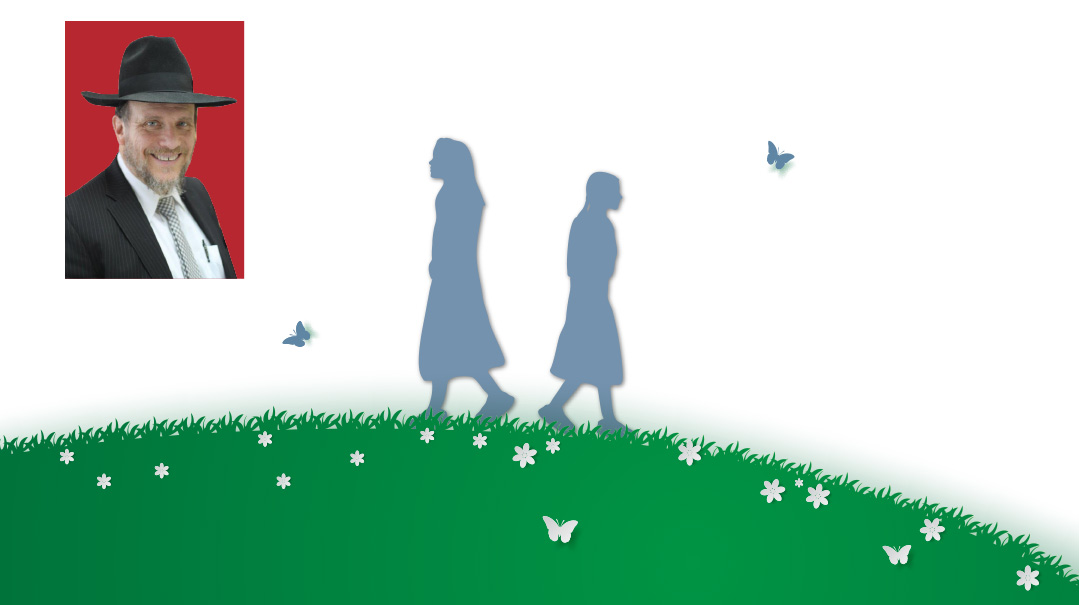“How Do I Help One Child without Leaving the Other Out?”

“Take the person you want to speak with out of the room rather than asking the other person to leave”

Question
I am a mother of five children kein ayin hara. My two oldest are both girls, just two years apart in age. The older one got married eight months ago, and found out she was expecting good news soon afterward. Sadly, she suffered a second-trimester loss. It was a complex, painful ordeal, and the experience has been very trying for her.
Since then, my daughter and son-in-law have been coming for Shabbos often. My married daughter wants to spend time talking to me, and the conversation inevitably turns painful and private. But my next daughter, who has always been so close to her older sister, now feels left out and rejected. Is it unfair to her that we tell her to leave the living room couch and go read somewhere else? It is her home too, after all. But on the other hand, my oldest daughter is going through a tzarah, and genuinely needs me. Is there a way to properly address both daughters’ needs?
Answer
The answer to this question needs to be prefaced by an acknowledgment of the difficulty your older daughter is experiencing. A woman who suffers a loss like this will very likely feel a tsunami of emotions; her hopes have been crushed, and a sense of loss and emptiness, as well as fear for the future, are all very common and understandable, even when a woman already has other children.
When a young woman experiences the loss of her first pregnancy, the fear is often intensified. She worries if she will ever be able to bear a child; will ever be a mother? The knowledge that statistically every one out of seven pregnancies end in miscarriage (some say it may even be one out of every five) will not necessarily alleviate her very real fear and concern.
Forty years ago a member of my extended family lost triplets in her third trimester, after waiting six years for children. I approached my rebbi, Rav Wolbe ztz”l, to ask for guidance toward trying to offer some level of nechamah, and he told me to share with my relative the following thought. The Gemara in Sanhedrin 91a states that Rabbeinu Hakadosh and Antoninus came to the conclusion that the neshamah enters the body from the time of conception. My rebbi went on to explain that helping my relative understand that the pregnancy brought three neshamos into This World would help her understand that the experience was not in vain.
Similarly, your daughter needs to know that she brought a neshamah down into This World! The world of neshamos, Rav Wolbe explained, is among the most hidden secrets of the Torah, but it’s clear that every neshamah that comes down to This World has a purpose.
Let’s note, on the other hand, that your ambivalent feelings about your single daughter are totally justified. She is still living in your home; she does not have a husband, she has parents. She used to enjoy a close relationship with her sister, but now her sister’s new husband has “taken her away,” and there is only a small (albeit important) place left for her in her older sister’s life. Please understand that I am not speaking psychobabble — these are real emotions many girls feel when a sibling they were close to gets married.
The bottom line is that your daughter may already feel she has lost her sister to some extent; she certainly still needs you very much, and now her sister is taking you away from her as well.
Now that we’ve fleshed out the question, let’s try to work out the best way to fulfill these conflicting responsibilities.
As parents trying to deal with siblings with competing needs, we often harbor an unrealistic assumption that all parties understand the situation, and that there is no need to spell things out. So often, we avoid real conversations that touch highly emotional issues, but that only allows for hurt and resentment to fester.
As a parent, it’s incumbent upon you to help your children recognize the dynamics of the situation, speaking openly and honestly, while giving everyone the kavod and validation that they need. Your older daughter really needs you now, no doubt, but she is capable of understanding that her sister might need you as well. Your younger daughter may be displaying a greater need for you than ever before, only because she feels like she is losing yet another important relationship. A straightforward conversation with her, in which you explain how much you love spending time with her and the rest of the family, and an explanation about what her older sister is experiencing and her short-term need for increased attention, will help your younger daughter put her needs aside and understand that she is not losing you.
I cannot find the exact quote right now, but I remember learning in Maseches Derech Eretz that when you want to have a private conversation, the proper way is to take the person you want to speak with out of the room rather than asking the other person to leave.
Saying, “Esther, please sit where you are, I need to speak with your sister and I’ll be back soon,” conveys respect for your younger daughter, and also conveys that the discussion will come to an end at some point.
It’s also quite likely that when the conversation is transparent, both girls will understand the needs of the other and be less “needy” and more forthcoming to the other. Do not be surprised if your younger daughter becomes very okay with the situation and offers to go to her room while you take over the living room. Even if she does offer, though, you might still want to go to a different room. She lives in the house and should not be made to feel unwelcome in her own home.
In general, in any situation where siblings have competing needs, when we let ourselves be open about the discomfort that already exists and put it on the table for discussion, it gives us all the ability to look at the situation somewhat objectively and come to an understanding that gives both children validation. The confirmation that we love them, care about them, and are sensitive to their feelings can be more powerful than the time that is being “taken away.”
(Originally featured in Mishpacha, Issue 942. Eytan Kobre may be contacted directly at kobre@mishpacha.com)
Oops! We could not locate your form.







